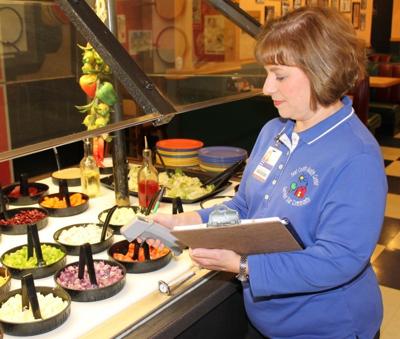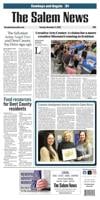The Dent County Health Center conducts food inspections at restaurants to ensure food service is healthy for customers.
Health inspector Roma Jones said the results are good in Dent County. She has not had to shut a restaurant down due to unsafe conditions or food that is not properly prepared or stored.
"Very few restaurants don't do what I ask them to do, "Jones said. "Whatever corrections I recommend are taken care of and corrected."
Jones said an important part of her job is to also teach businesses the importance of clean restaurants, the proper handling of food and preparation.
"Not only do we inspect restaurants, but it's also part of our job to teach the right way to do things," Jones said. "It's important to look out for public safety."
Restaurants are classified as having high, medium or low hazardous factors, with each having critical and non-critical violations.
How often a restaurant is inspected is whether or not it has high, medium or low hazardous risk factors. High or medium risk restaurants are inspected once a year. Others are inspected every two years.
Jones said if she receives a complaint, she will contact that business and start inspections as soon a possible.
"It's a thorough process," Jones said. "I start at the hand sink and check labeling, food temperatures, how food is stored, if lights are covered, the temperatures food is stored, displayed and prepared. I look at everything."
Once the inspection is complete, violations will be posted with the business and corrective measures established.
Critical violations have to be corrected within 72 hours. Non-critical items will be corrected on a date agreed to between the inspector and the facility.
If violations are consistent, not corrected or changed, Jones said the state is contacted and violators can be closed down. She said that's not occurred since she has been inspecting restaurants in Dent County.
Critical violations include:
• A person in charge must be present at all times that an establishment is open, that this person is knowledgeable about food borne illness outbreaks, that food cannot be prepared in personal homes or in a room that is used for living or sleeping quarters.
• People working in a food establishment will not eat, drink or use tobacco in the kitchen area. That workers cannot come to work with discharges form eyes, nose or mouth.
• Food establishment workers will know when, where and how to wash their hands. Workers will not touch ready to eat foods with their bare hands.
• Foods used in an establishment must be obtained from an approved food source; the use of home canned foods is prohibited. Foods must be checked for temperature and be in sound condition when delivered.
• Foods served in a food establishment must be protected from cross contamination by: separating raw animal foods during storage, preparation, holding, and display from: raw ready-to-eat food including other raw animal food such as fish for sushi or Molluscan shellfish or other raw ready-to-eat food such as vegetables, and cooked ready-to-eat food, equipment food-contact surfaces and utensils shall be clean to sight and touch.
• Food displays shall be protected from contamination by the use of packaging, counter, service line, or salad bar food guards: display cases; or other effective means.
• Potentially hazardous foods shall be cooked for a proper time, and temperature. Reheating for hot holding shall be reheating the food to 160 degrees or above and then the food shall be held at 140 degrees or above. Proper cooling methods will be used to cool hot foods before storage. Cold holding of foods shall be that they are held at 41 degrees or below.
• Potentially hazardous food shall be dated to be used within seven days. They will also be labeled as to their contents. If an establishment is using time as a public health control they will have written procedures and records.
• The consumption of animal foods that are raw, undercooked or not otherwise processed to eliminate pathogens shall have a warning.
















